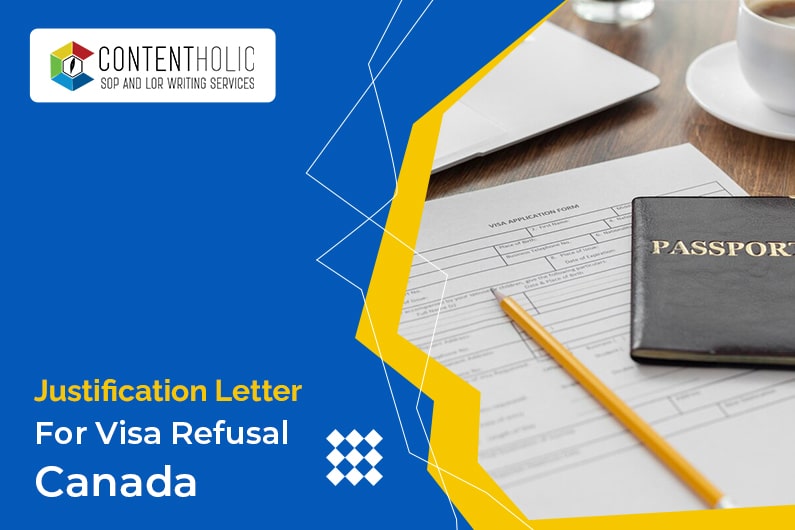Embarking on a journey to Canada is a dream for many, given its captivating beauty and diverse landscapes. From the majestic Rocky Mountains to the serene lakes, Canada boasts an unparalleled natural allure. However, when faced with a visa refusal, the dream may seem momentarily dimmed. In this blog, we delve into the intricacies of crafting a Justification Letter for Visa refusal Canada, providing insights in simple English. We aim to guide you through this process, ensuring clarity and ease. As we navigate the pathway to a successful visa application, let’s not forget the enchanting landscapes and the promise of new beginnings that Canada holds. Join us on this journey to overcome obstacles and rediscover the beauty that Canada offers to those who dream of calling it home.
What is a Justification Letter for Visa refusal in Canada?
A Justification Letter for a Canadian visa refusal is a document that seeks to explain the reasons behind the denial of a visa application. It serves as a concise and clear explanation, addressing concerns raised during the initial assessment. The letter aims to provide additional information or clarifications to rectify any misunderstandings and strengthen the applicant’s case for reconsideration. The key purpose is to demonstrate the applicant’s genuine intentions, emphasize ties to their home country, and alleviate any apprehensions that led to the initial refusal. The letter plays a crucial role in requesting a second review of the Visa Refusal Explanation Letter application, with the ultimate goal of securing a positive outcome and realizing the applicant’s plans to visit or stay in Canada.Reasons for Canada Visa refusal
- Insufficient Financial Support: A common reason for visa refusal is the inability to demonstrate adequate financial resources to cover the expenses during the stay in Canada. This includes funds for accommodation, transportation, and daily living expenses.
- Incomplete Documentation: Submitting incomplete or inaccurate documents is a frequent cause of refusal. It’s crucial to ensure that all required paperwork is provided and accurate to avoid any misunderstandings.
- Unstable Immigration History: Previous irregularities in immigration status, such as visa violations or overstays, can raise concerns and result in visa denials.
- Unclear Purpose of Visit: Failing to clearly articulate the purpose of the visit can lead to doubts about the applicant’s intentions in Canada. It’s essential to provide a detailed and transparent explanation.
- Inadequate Ties to Home Country: Weak connections to the home country, such as lack of employment, family ties, or property ownership, may lead immigration authorities to question the applicant’s intention to return.
- Criminal or Security Concerns: Applicants with a criminal record or security issues may face visa refusals due to potential risks associated with their entry into Canada.
- Health and Medical Issues: Certain health conditions or failure to undergo required medical examinations can be grounds for visa refusal.
- Incomplete Travel History: A lack of a consistent and credible travel history may raise doubts about the applicant’s intentions and credibility.
- Employment and Education Discrepancies: Discrepancies or inconsistencies in employment or educational records may lead to concerns about the authenticity of the applicant’s background.
- Failure to Demonstrate Ties to Family: Inability to show strong ties to family in the home country can be a reason for refusal. This might indicate a lack of compelling reasons to return home after the visit.
Justification Letter for Visa Refusal Canada: Structure
- Introduction: Commence the letter with a formal salutation, expressing the purpose of seeking reconsideration for a visa refusal. Clearly articulate the intent to address the concerns outlined in the refusal letter.
- Acknowledgment of Refusal: Acknowledging the visa refusal and mentioning the specific date of the refusal letter demonstrates an understanding of the decision and lays the groundwork for a constructive response.
- Understanding Refusal Reasons: Provide a brief but comprehensive overview of the reasons cited for the visa refusal, as stated in the refusal letter. This ensures a shared understanding of the concerns that need to be addressed.
- Reiteration of Genuine Intentions: Clearly state the genuine purpose of the visit to Canada and emphasize the strong ties to the home country. Reinforce the commitment to return after the intended stay, assuring immigration authorities of your adherence to visa regulations.
- Addressing Financial Concerns: Devote a section to providing detailed information about financial stability. Include evidence demonstrating the capacity to cover all expenses during the stay in Canada, addressing any financial concerns raised.
- Clarifying Any Misunderstandings: Address any misunderstandings or discrepancies mentioned in the refusal letter. Offer clear and concise explanations or provide additional information to rectify these issues and clarify your position.
- Highlighting Changes Since Application: Emphasize changes in circumstances since the initial application. Explain how these changes address concerns and strengthen the overall application. Clearly articulate these modifications for a thorough understanding.
- Expressing Regret and Sincerity: Convey regret for any confusion or inconvenience caused by the initial application. Reiterate sincerity in complying with visa regulations and express respect for Canadian immigration policies, fostering a positive tone.
- Conclusion with Optimism: Conclude the letter on an optimistic note, expressing gratitude for the opportunity to present additional information and requesting a reconsideration of the visa application. Reinforce optimism for a positive outcome.
- Formal Closing: For formal identification purposes, close your SOP with a formal closing, such as or “Yours faithfully” or “Sincerely”. Include your full name and any identification numbers that you provided in the initial application.
Strengthen your Appeal Letter: Supporting Documents
In enhancing the effectiveness of your visa appeal letter, the attachment of well-curated supporting documents is pivotal. The embassy’s concerns regarding the clarity of your visit’s purpose can be assuaged with:- Booked Flight Tickets and Itinerary: Reshare a detailed itinerary along with evidence of booked flight tickets, elucidating the specifics of your visit.
- Letter of Invitation and Admission Letters: Include a letter of invitation, whether from a university or an employer, to substantiate the purpose of your visit. Admission letters, if applicable, strengthen this aspect.
- Cover Letter: Craft a cover letter explaining your choice of the destination country. Clarify the reasons behind your decision and provide a “why factor” to offer a comprehensive understanding.
- Student Enrollment or Employment Contracts: Submit documents such as student enrollment papers or employment contracts that underscore your commitment to returning.
- Ancestral Presence and Family Ties: Furnish certificates establishing ancestral ties or documents like marriage certificates that prove your intent to return for family-related obligations.
- Should issues arise regarding travel insurance coverage:
- Proof of New or Updated Insurance: If the existing travel insurance is deemed unsuitable, provide evidence of a new purchase or an updated policy that meets the necessary requirements.
- Latest Bank Statement: Attach your most recent bank statement, and consider depositing extra funds to strengthen your financial position.
- Letter of Financial Support: Include a letter of support from someone willing to financially back your stay, along with their current bank statement.
Justification Letter for Visa Refusal Canada: Key Points To Remember
Writing an SOP after refusal requires a strategic approach to present your case persuasively. Here’s a comprehensive guide:- Understanding Refusal Reasons: Begin by carefully analyzing the visa refusal letter. Identify the specific reasons stated by the immigration authorities. Understanding these concerns is crucial for addressing them effectively in your justification.
- Formal Salutation and Purpose Statement: Start with a formal salutation and a concise statement of purpose. Clearly express that your intent is to seek reconsideration of your visa application.
- Providing Additional Information: Systematically address each reason for refusal. Offer detailed and relevant information to counter or clarify the concerns raised. This may include additional documentation, explanations, or context regarding your application.
- Emphasizing Genuine Intentions: Articulate the genuine purpose of your visit, whether it’s for tourism, study, or work. Highlight your strong ties to your home country to assure the immigration authorities of your intent to return.
- Maintaining a Formal and Respectful Tone: Throughout the letter, maintain a formal and respectful tone. Use polite language and structure your sentences in a way that demonstrates sincerity and respect.
- Addressing Financial Concerns: If financial matters were a concern, provide comprehensive details about your financial stability. Present evidence of your capacity to fund your stay in Canada.
- Highlighting Changed Circumstances: If there have been changes in your circumstances since the initial application, clearly highlight these changes. This could include employment status, family situations, or other relevant factors.
- Expressing Regret and Sincerity: Express regret for any misunderstandings that may have led to the refusal. Assure the immigration authorities of your sincerity and commitment to complying with visa regulations.
- Concluding with Positivity: In the conclusion, express gratitude for their consideration and reiterate your optimism for a favorable outcome. Maintain a positive and confident tone.
- Seeking Professional Guidance: If the refusal reasons are complex or if you feel uncertain, consider seeking assistance from immigration professionals who can provide guidance based on their expertise.
- Thorough Proofreading: Before submission, thoroughly proofread the letter. Ensure clarity, coherence, and a polished presentation free from grammatical errors.






